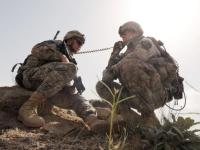MALE CORRESPONDENT: WikiLeaks.org, a whistleblower website, has published what it says are nearly 92,000 official U.S. documents -
FEMALE CORRESPONDENT: - filed about the war in Afghanistan from 2004 to 2009. Raw data from the front line -
MALE CORRESPONDENT: It poses a very real and potential threat to those that are working hard every day to keep us safe.
BROOKE GLADSTONE: Some 91,000 documents related to the U.S. war in Afghanistan were released last Sunday, minus 15,000 they delayed for, quote, “harm minimization” reasons. The political and military impact won't be known for some time, but the single largest leak of classified documents in U.S. history is a tremendous display of power by the self-described whistleblower site, WikiLeaks, which paired with three news outlets, The New York Times, The Guardian and Der Spiegel, for as wide a reach as possible. According to two of those internal military memos leaked by WikiLeaks, on August 25th, 2009 the 2nd Battalion 8th Marines Echo Company in Afghanistan exchanged small arms fire, or SAF, with the enemy, or EN. The documents itemize each instance of SAF from each specific location and conclude their account with the bomb that was finally used. In U.S. military terms, “Primal 3-1 (Harrier) dropped (1)-GBU 12 on the compound, effectively suppressing the EN threat.” But, according to Noah Shachtman of Wired Magazine who was with Echo Company during the firefights, this step-by-step military account only tells a fraction of the story.
NOAH SHACHTMAN: The sort of critical moment in the documents is that a Harrier jet dropped a 500-pound laser-guided bomb on a compound, and it says the threat was suppressed. But what it doesn't say is how many times the captain opted not to use that bomb because 1) he was worried about the damage to civilian life or to civilian property and 2) the rules set down by General Stanley McChrystal, his boss’ boss’ boss’ boss, said that you really can't use air power in any instance unless it’s really, really, really critical. And then when the captain finally did decide to drop that bomb, it says the enemy threat was suppressed. But the suppression only lasted 17 minutes, and then the fighting started again. What the documents don't even allude to is while this American captain was fighting the fight, his British counterpart and his Afghan counterpart were in the nearby villages sitting down with local elders, trying to gain their support.
BROOKE GLADSTONE: What else do you think was missing?
NOAH SHACHTMAN: One of the important things missing was just in how much danger the Marines were there. These guys were surrounded. And yet still, their captain held off from dropping a bomb that might have ended the conflict instantly. You know, there were bullets flying by people’s heads and missing by inches.
BROOKE GLADSTONE: These memos that were released were basically written from someone in the field to his boss or her boss.
NOAH SHACHTMAN: Yeah, and I think we've all got experience with interoffice memos, and they don't always tell what’s going on in the office. Readers might be led to believe that all that’s going on in Afghanistan is people shooting each other or blowing stuff up, and that’s just not the case.
BROOKE GLADSTONE: So what do the documents say about the military’s own internal communications?
NOAH SHACHTMAN: They say that they've got to change. The military is still talking to itself as if blowing up stuff and shooting guys are the most important metrics, and in a fight like this, they're not. David Kilcullen, who’s a big theorist of counterinsurgency, and a practitioner too, talks about counterinsurgencies as a wide scope of conflict that starts from armed coercion to more soft political persuasion. Military’s communication these days only seems to concentrate on the armed coercion part but until it encompasses all of it, it’s not really going to get at this larger competition.
BROOKE GLADSTONE: What do you think readers should bring to these documents when they read them?
NOAH SHACHTMAN: I think they've got to bring a critical eye. They can't be duped into thinking that this is the raw, unvarnished capital T - Truth. What they're reading is just kind of an echo of what actually went on.
BROOKE GLADSTONE: Noah, thank you very much.
NOAH SHACHTMAN: Thanks for having me.
BROOKE GLADSTONE: Noah Shachtman writes for Wired Magazine.
